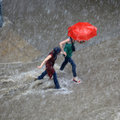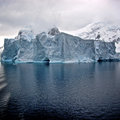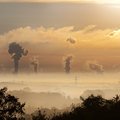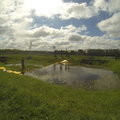News
02 December 2019
Water lust and nuisance

Reliable tap water, proper waste water treatment, and dry feet. That’s what people in the Netherlands expect and are accustomed to. However, flooded homes, sewer overflows and impassable roads occur with increasing frequency. The Randstad conurbation has suffered from severe water issues in recent months for instance. The KNMI [Royal Netherlands Meteorological Institute] has predicted that the number of extreme showers will further increase in the 21st century due to global warming. The water infrastructure in our urban areas isn’t built to accommodate this, warns Professor Jules van Lier. He argues in favour of smarter solutions and a new paradigm for our Urban Water Infrastructure.
30 November 2019
Sinking sea water and rising sea level

In 2014 Caroline Katsman was awarded a Vidi grant to conduct research into the influence of ocean whirls on surface water sinking. How is she getting on two (and a bit) years later? ‘2017 is going to be a bumper year, with a number of new papers in the pipeline,’ Katsman says.
27 November 2019
Measuring air pollution street by street

"My research focuses on the use of remote sensing data to improve the modelling of air quality in polluted areas such as the Rijnmond near Rotterdam that is known to have the highest level of air pollution in the Netherlands. Everything is jammed together there: traffic, power stations, shipping and industry. The area is the most relevant one in the country for research into determining air pollution. Incidentally, we also focus on other countries: we want to implement our approach in New Delhi, one of the world’s most polluted cities.
25 November 2019
BRIGAID: Solutions for extreme climate events

Climate scientists are predicting an increase in droughts, floods and other extreme weather events as a result of continuing global warming. BRIGAID (Bridging the gap for Innovations in Disaster Resilience), an ambitious programme initiated by a partnership of European universities, research institutes and businesses in May of this year, is aimed at finding innovative ways of coping with the increased likelihood of natural disasters of this kind. Bas Jonkman (39), Professor of Integral Hydraulic Engineering at TU Delft’s faculty of Civil Engineering and Geosciences will be heading this multifaceted programme for the next four years.
12 November 2019
Clouds and climate

Herman Russchenberg is engaged in intensive and extensive research into the causes of climate change. His own research involves investigating the role played by clouds and dust particles in the atmosphere, but he is also head of the TU Delft Climate Institute, established in March 2012 to bring together TU Delft researchers working on all aspects of climate and climate change. Russchenberg started out in the faculty of Electrical Engineering, conducting research into the influence of the atmosphere (rain, clouds) on satellite signals. After obtaining his PhD in 1992, he shifted his attention to the physics of water vapour, water droplets, dust particles, sunlight, radiation and emissions in the atmosphere. He is now based in the faculty of Civil Engineering and Geosciences.